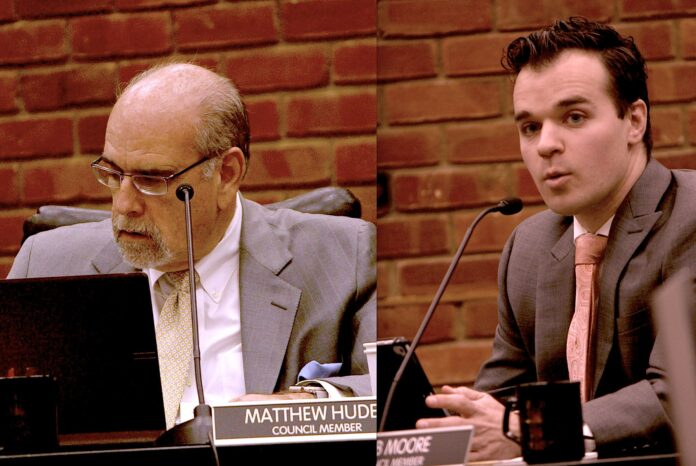
During last week’s hour-long Policy Committee meeting to address issues with Los Gatos’ rules for Council members and commissioners, Councilmember Matthew Hudes refused to allow Councilmember Rob Moore to have a hand in improving guidelines his partner was recently found to have violated.
And Hudes pointed to the ACLU’s threat of legal action over a broken Code of Conduct process—which he’d earlier cited in his decision to vote to censure Moore’s girlfriend, Kylie Clark, a planning commissioner—as one reason not to make progress on plugging the gaps in the handbook, March 28.
It was less than a week before Council was set to discuss, in closed session April 3, “significant exposure to litigation” in relation to the American Civil Liberties Union backing of Clark’s right to speak up on behalf of pro-housing policies, even to the point of referencing the racial and socioeconomic status of critics.
And it was happening in the context of a text message coming to light, via a Mercury News report, in which former Town Attorney Rob Schultz tells Mayor Maria Ristow he believes current Town Attorney Gabrielle Whelan didn’t follow the proper procedure as Clark was being disciplined.
In her staff report, Whelan noted that at its previous meeting the Policy Committee had discussed whether the Code of Conduct should apply to members of boards and commissions and pointed to changes that would require the mayor and vice mayor be included alongside the Town Manager and Town Attorney on a complaint evaluation body.
In the following days, staff realized that if the evaluation committee consists of the mayor and the vice mayor it constitutes a committee under the Brown Act, meaning it would have to be properly noticed and follow other strict rules, she explained.
“That’s something for this committee to consider, whether or not that’s desirable,” Whelan said.
In the case of Clark’s discipline, Vice Mayor Mary Badame—a staunch opponent of some priorities the commissioner advocates for—had been added to the evaluation committee—alongside the mayor—due to Ristow’s known support of Clark.
Los Gatos online agenda center, where meetings are noticed according to Brown Act rules, does not appear to include an “evaluation committee” meeting to discuss the censure of Clark in 2022 or 2023.
Whelan told the Los Gatan the committee that weighed how to handle complaints into the email Clark sent to the California Department of Housing and Community Development technically didn’t fall under the Brown Act.
“The Brown Act applies to committees created by formal action of a legislative body such as the Town Council (e.g., by adoption of a policy),” she wrote. “However, the evaluation committee that convened to review the complaints submitted in this matter was not a committee created by formal action of a legislative body.”
During last week’s meeting, Hudes was not interested in providing much input into possible Code of Conduct policy changes.
“Due to the current makeup of this committee, I do not feel it is appropriate to provide direction or make any recommendations to the council,” he said, referencing Moore’s relationship. “I will not be participating in providing direction or making recommendations.”
He also said portions of the staff report were “inappropriate to discuss at this point,” because of the “makeup of the current committee,” he said referring, again, to Moore, adding that “a group of individuals are threatening the Town with litigation regarding the subject matter of this meeting,” pointing to the ACLU’s representation of Clark.
“On the other hand, if the public, or other organizations have suggestions for the Code of Conduct, I think the Town should consider them, and I would certainly welcome hearing them,” he said.
Moore asked if Hudes might be more comfortable if Code of Conduct changes were discussed by Council.
“I don’t want to waste anyone’s time if all we’re going to be doing is just talking about this,” he said.
Discussing updates would essentially be commenting on the failures of current practices—which isn’t a good idea with litigation in the air, Hudes replied.
Moore said he felt it was appropriate to dig into improving the Code of Conduct, as that might actually reduce the threat of legal action—since it could mend the portions of Los Gatos’ HR rulebook the ACLU finds concerning.
“I definitely have a different opinion,” he said. “I think these are legislative priorities of the Town Council that we’re kind of working through to see what we’re telling staff to spend time on.”
And Moore brought up the Brown Act question about the mayor and the vice mayor being on the complaint evaluation committee.
“So, that would mean it would have to be a public meeting?” he asked.
“Right,” Whelan confirmed. “Noticed.”
Then, Moore asked Whelan if discussing the Code of Conduct could expose the Town to additional potential litigation.
“In my opinion, it would not,” she said.









